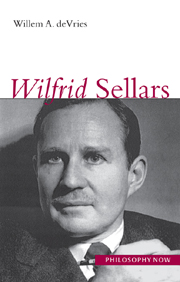Book contents
- Frontmatter
- Contents
- Preface
- Abbreviations
- 1 Sellars's philosophical enterprise
- 2 Sellars's philosophy of language
- 3 Categories, the a priori, and transcendental philosophy
- 4 Sellars's nominalism
- 5 Knowledge and the given
- 6 Science and reality
- 7 Intentionality and the mental
- 8 Sensory consciousness
- 9 Practical reason
- 10 The necessity of the normative
- Notes
- Bibliography
- Index
5 - Knowledge and the given
- Frontmatter
- Contents
- Preface
- Abbreviations
- 1 Sellars's philosophical enterprise
- 2 Sellars's philosophy of language
- 3 Categories, the a priori, and transcendental philosophy
- 4 Sellars's nominalism
- 5 Knowledge and the given
- 6 Science and reality
- 7 Intentionality and the mental
- 8 Sensory consciousness
- 9 Practical reason
- 10 The necessity of the normative
- Notes
- Bibliography
- Index
Summary
Sellars wrote a number of essays dealing with epistemological issues, but the principal texts where the issues are discussed in depth include “Empiricism and the Philosophy of Mind”, “The Structure of Knowledge” and a series of essays in which he responds to Roderick Firth's “Coherence, Certainty, and Epistemic Priority”, including “Givenness and Explanatory Coherence” (1973), “More on Givenness and Explanatory Coherence” (1979) and finally, the Carus Lectures for 1977, published as “Foundations for a Metaphysics of Pure Process” (1981). Sellars's views in epistemology clearly evolved in the course of these twenty-plus years, but whether the changes are simply refinements of his early doctrines or major revisions, even disavowal of some of those doctrines, is a matter of some debate.
Sellars's epistemology is complicated by the fact that he never wrote a purely epistemological essay. Especially in the major texts just mentioned, metaphysical issues, particularly those in the philosophy of mind, are inextricably interwoven with matters epistemological. This is no surprise, for Sellars thinks that one cannot prosecute epistemology without some metaphysical convictions about the nature of the world and the mind that knows it; for that matter, neither can one undertake metaphysics without at least a prototheory of knowledge to explain the authority of one's claims. Nevertheless, in this chapter I shall try to tease out the more purely epistemological aspects of Sellars's philosophy.
Some dimensions of empirical knowledge
Sellars's theory of knowledge is a complex attempt to balance competing insights in several different dimensions: empiricist–rationalist, foundationalist–coherentist, externalist–internalist, realist–phenomenalist–idealist.
- Type
- Chapter
- Information
- Wilfrid Sellars , pp. 94 - 141Publisher: Acumen PublishingPrint publication year: 2005



